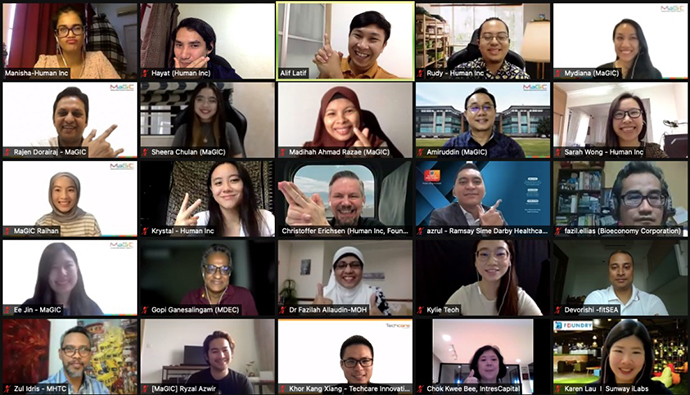
According to a study by Finn Partners Asia, healthcare is set to become a USD 2.2 trillion market by 2026. In Bain & Company’s Asia-Pacific Front Line of Healthcare Survey, over 91 per cent of respondents said they would use digital health apps and services if the costs were covered by an employer or insurance provider.
The digital health market that covers a broad scope of technologies, including mobile health apps, connected wearable devices, and telemedicine, has been on the rise for almost a decade now. The coronavirus pandemic also acts as a catalyst to lead the surge of digital health adoption across Asia and beyond. Amidst extended movement limitations and physical interaction restrictions, digital health continues to remain a permanent fixture and people are becoming more aware of remote monitoring and self-care.
In Malaysia, medical startups such as Nexuses, GetDoc, QueueMed, and Beli Ubat are leading the industry. These startups offer a range of medical products and services from digital healthcare ecosystems to medical product e-commerce platforms and everything in between.
Furthermore, to help curb the pandemic and contact trace, the government launched a medical-driven app called MySejahtera. The app eventually evolved into a multi-function platform that covers medical appointments, mobile live queues, and virtual health among others.
Bringing key industry stakeholders together to explore the scope of digital health
The Malaysian Global Innovation and Creativity Centre (MaGIC), in collaboration with Human Inc recently concluded a Digital Health & Wellness Roundtable event exploring the rise of medical startups in Malaysia, a surge in voluntary public adoption of wellness startups, industry pain points and barriers to further innovation, such as fragmented legacy systems, difficulties in showing values and at times, a disconnection with patient needs. The event was attended by key stakeholders and industry leaders, including corporates, startups, investors, and government agencies.
Also read: What opportunities await global startups that are expanding to Japan
Speaking on the inspiration or objective behind the event, MaGIC Acting Chief Executive Officer (ACEO) Khalid Yashaiya shared that the main goal was to bring together different players and to obtain insights on the Digital Health & Wellness industry trends, innovation outlook, and investment opportunities, facilitate idea exchange and identify collaborative opportunities within the innovation ecosystem through this engagement. Such initiative is especially pivotal as we continue to brace the ongoing challenges and unpredictability of the pandemic.
Human Inc. Senior Consultant Alif Latif added “Living through a pandemic, health & wellness has taken centre stage in all of our lives, not just in our fight against COVID-19, but also in making sure we keep ourselves healthy both mentally and physically. When MaGIC mooted the idea of a collaboration for a Digital Health & Wellness Roundtable, we jumped on to this opportunity. Leveraging our expertise in facilitation and innovation together with MaGIC’s extensive reach in the startup community, we co-created a roundtable with the aim of engaging participants from different organisations which may not normally be in the same space to have insightful conversations around industry trends, challenges and potential collaborations.”
Discovering industry trends, current challenges and scope of digital health in Malaysia and beyond
Human Inc’s Alif Latif shared, “We wanted to obtain a consensus on the trends relevant to the Malaysian landscape and uncover new potential areas of collaboration that can work across the industry and traditional boundaries.”
During the session, it was discussed that according to the Malaysian Science and Technology Information Centre (MASTIC)’s National Survey of Research and Development (R&D), medical and healthcare forms about 9 per cent (RM135 million) of the total gross domestic expenditure on research and development (GERD) for Malaysia, which is estimated at RM1.5 billion in 2018. However, despite growing demand and potential, the medtech ecosystem in Malaysia’s “economics of medtech innovation” still poses so many opportunities for the industry to take the next level not only regionally but globally.
Reports tend to agree with this observation. For instance, in this report, The Star elaborates that challenges still exist in adopting readily available technologies in Malaysia, and how the medical system is still somewhat struggling with the necessary adaptation to the health information ecosystem. This study by Galen Centre explores challenges, such as lack of regulatory frameworks or guidelines, capacity, clinical leadership and accessibility issues for those who are technologically illiterate, lack access to electronic devices, internet and electricity. The study further states that investing in digital solutions could dramatically improve productivity and efficiency, with benefits in both patient outcomes and cost.
Leveraging technology for innovation and collaboration in the digital health landscape

The industry leaders at the MaGIC Digital Health & Wellness Roundtable denote the importance of innovation and how it has been a beacon through many of the world’s darkest periods, and will be a guiding light as we navigate our way to restore lives and livelihoods in a post-pandemic future.
Another important point highlighted during the discussion was the importance of collaboration moving forward. “For this reason, Malaysia’s newly launched agency, the Malaysian Research Accelerator for Technology and Innovation (MRANTI) will be driven by Speed, Scalability, Synergy which are interlinked — and when enabled, will help take Society forward – for our collective wealth and well-being, through med-tech and a host,” said Khalid, ACEO of MaGIC.
Paresh Subramaniyam, Founder and CEO of FitXcapes Sdn Bhd, said, “As service providers in this industry, it is increasingly important that we constantly learn from each other, have each other’s backs, and grow the industry together.”
FitXcapes is a one-stop wellness solutions provider that customises and executes small to large scale corporate wellness programs. The FitXcapes ENGAGE platform is designed to be as simple as possible and can be used by all generations in the corporate world, thus addressing the generational tech divide. “We gather user input and improve the platform on a quarterly basis. Our platform makes it easy for HR to manage reports, send reminders, and promote participation. Email marketing and posters are also provided by our team,” Paresh elaborated.
Also read: 26 Japan startups eye business growth with the help of Techstars
He shared that the Digital Health & Wellness roundtable was a great opportunity with the coming together of parties, such as MOH, MDEC, MaGIC, corporate sector representatives, investors and other industry players. “Sitting together as one to discuss the industry as a whole, policy, privacy and data security opened up many opportunities for us to find more ways to work together and ensure the best for our people and the industry,” he added
Another participant, Rajifah Ramli Co-founder & CEO, Data8 Sdn Bhd agrees. She said, “during the Health & Wellness roundtable, we learnt that there’s a lot of space for collaborations among the players in the industry. So, each one of us can really focus on what we do best, and through collaborations, we can provide more holistic services to the consumers.”
DATA8 Sdn Bhd develops cHEART, a personalised healthcare app that allows users/patients to track, monitor, share and transfer their health/medical data securely in order to make important decisions throughout their health journey and well-being. DATA8 believes that sufficient home work to be able to offer tailored solutions is crucial.
Rajifah shared, “When we worked with Hospital Kuala Lumpur(HKL) and Hospital Sungai Buloh (HSgB) to implement cHEART for post-discharge patients, we found that having buy-in up and down the organisation helps a lot. Once we gained the ‘greenlight’ from the management, we worked closely with the operational team; understanding their needs, what they want to achieve, the ideal outcomes so that we can develop a platform that matches with the needs.”
Increasing awareness and better adoption rates post-pandemic
In the aftermath of the pandemic, there is now more openness towards digital healthcare avenues. This is complemented by trends where Malaysians are becoming more open to technology. Khor Kang Xiang, Managing Director and co-founder of Techcare Innovation shared, “I have learned that the emergence of digital technology in healthcare is getting more acceptable by the Malaysian community with the increasing adoption of the digital economy.”
Studies support Xiang observation. As per Statista, as of the third quarter of 2020, the average daily time spent using the internet by people in Malaysia was around 9.17 hours. In comparison, they spent around 3.01 hours on social media every day. This definitely encourages the adoption of digital health technology that potentially further streamline and optimise the process of getting quality care services without physical constraint.
Techcare Innovation is a human technology company that develops and delivers smart rehabilitation devices to bring a better life for people through exercising. Xiang further shared that since the Movement Controller Order (MCO) last year, Techcare started implementing telerobotic training to provide robots at home together with the combination of telerehabilitation training by trained therapists for rehabilitation. “We are seeing positive results and experiences from patients whereby stroke patients can access advanced technology for intensive training together with guidance from a therapist without geographical constraint. And we foresee the future of rehabilitation will continue to have more adoption and combination of using digital technology for the more optimal result of the patient’s recovery,” he added.
Also read: Modern solutions to modern problems: How Plusman LLC innovates healthcare
Rapid technological advancements coupled with the impact of the recent pandemic on consumers’ health, has given rise to multiple market gaps and provided an impetus for stakeholders to adopt a radical change through the transformation of current products and services or the pursuit of new market opportunities. In response to the ecosystem’s challenges and increased conviction to drive innovation, there is a dire need to remove silos and to problem solve as an ecosystem, enabling innovation through rewards and boosting customer experiences through a better understanding of user needs as key courses of action that will move the industry forward.
“To ensure that we do not get left behind, moving with speed is absolutely essential. To do this, we need to streamline our processes, get rid of any overlap or ‘legacy’ inefficiencies, and utilise technology to automate or digitalise, and through MRANTI, we can do this,” concluded MaGIC’s ACEO Khalid. “While we look to harvest more medtech inventions at the end of the funnel, we also need to expand our supply pipeline of ideas. This calls for multiple parties to work in concert – the enculturation of innovation, to foster the growth of early-stage technology and innovation companies, and provide the necessary support to mature their products into viable solutions for the market,” he added.
Learn more about MaGIC at https://www.mymagic.my and find out more about Human Inc at https://www.humaninc.co. You can also access their full study here.
– –
This article is produced by the e27 team, sponsored by MaGIC
We can share your story at e27, too. Engage the Southeast Asian tech ecosystem by bringing your story to the world. Visit us at e27.co/advertise to get started.
The post Innovation and collaboration will lead Malaysia’s digital health scene into the future appeared first on e27.

